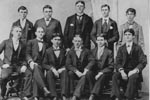 Alpha Tau Omega - 1896
[ large
image ] |
The cadets, however, refused to give up the cause, and
prevailed the following year. On November 22, 1894, Alpha Alpha Chapter of Phi Phi Phi was
established, and a chapter of Alpha Tau Omega, the first on Texas soil, was established
March 12, 1895. The eleven charter members were described as "students of the highest
standing in the classroom, social circles, literary society, and parade ground, and are
men of such character and energy as to make the success of the chapter a certainty."
This optimism proved to be premature. By 1896, discipline in general had
deteriorated to such an extent that it inevitably spilled over into the secret
organizations. Rivalry between them was fierce to the point of violence (of particular
concern since all were armed with military rifles). Undoubtedly because the faculty had
never been enthusiastic about the idea of secret societies, because there truly was a lack
of decorum, and perhaps partly because they were secret, the faculty resolved that the
Greek Letter fraternities were "a serious detriment to the harmony and welfare"
of the student body, and urged the board "to take such steps as may remove them from
our midst." |